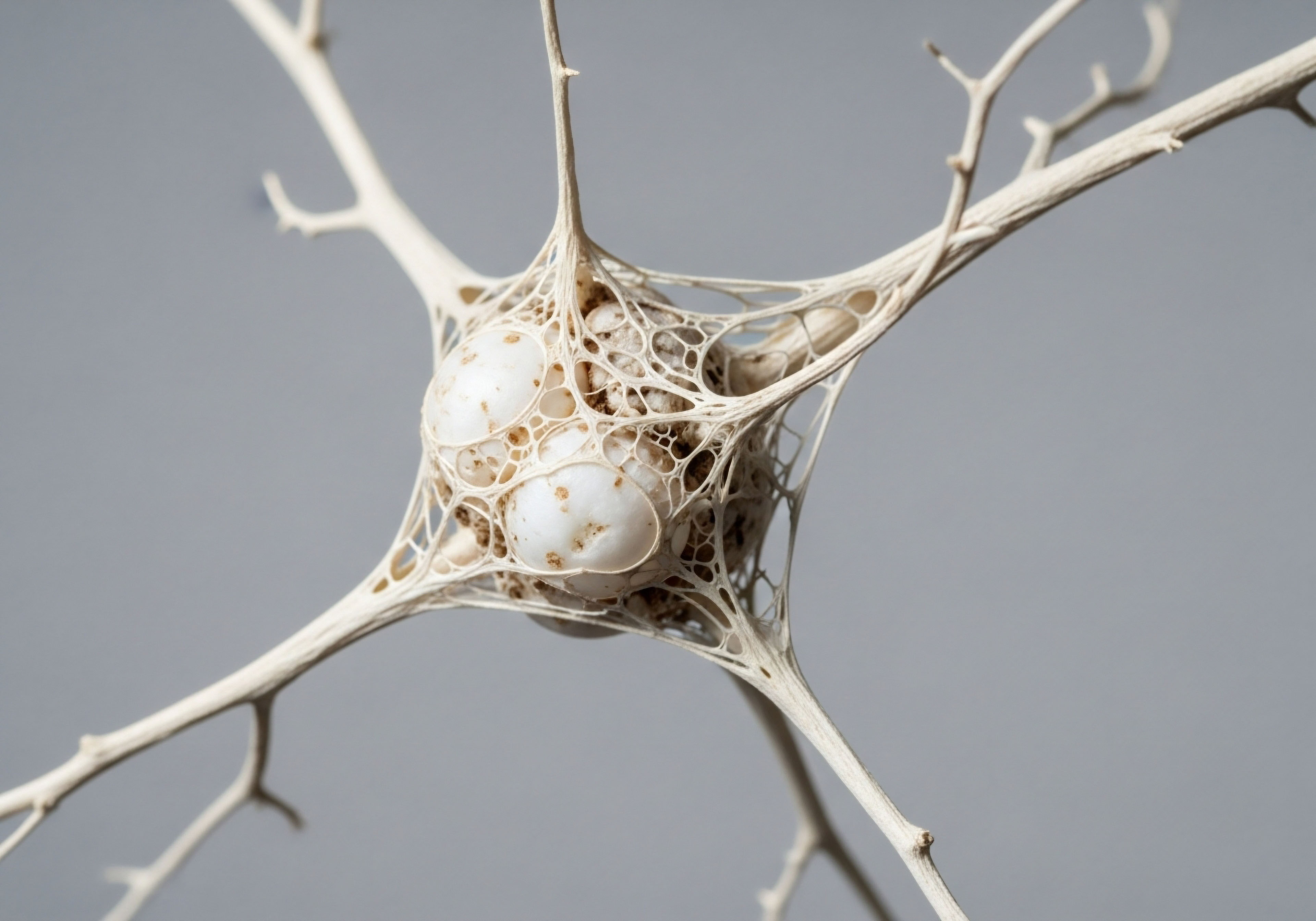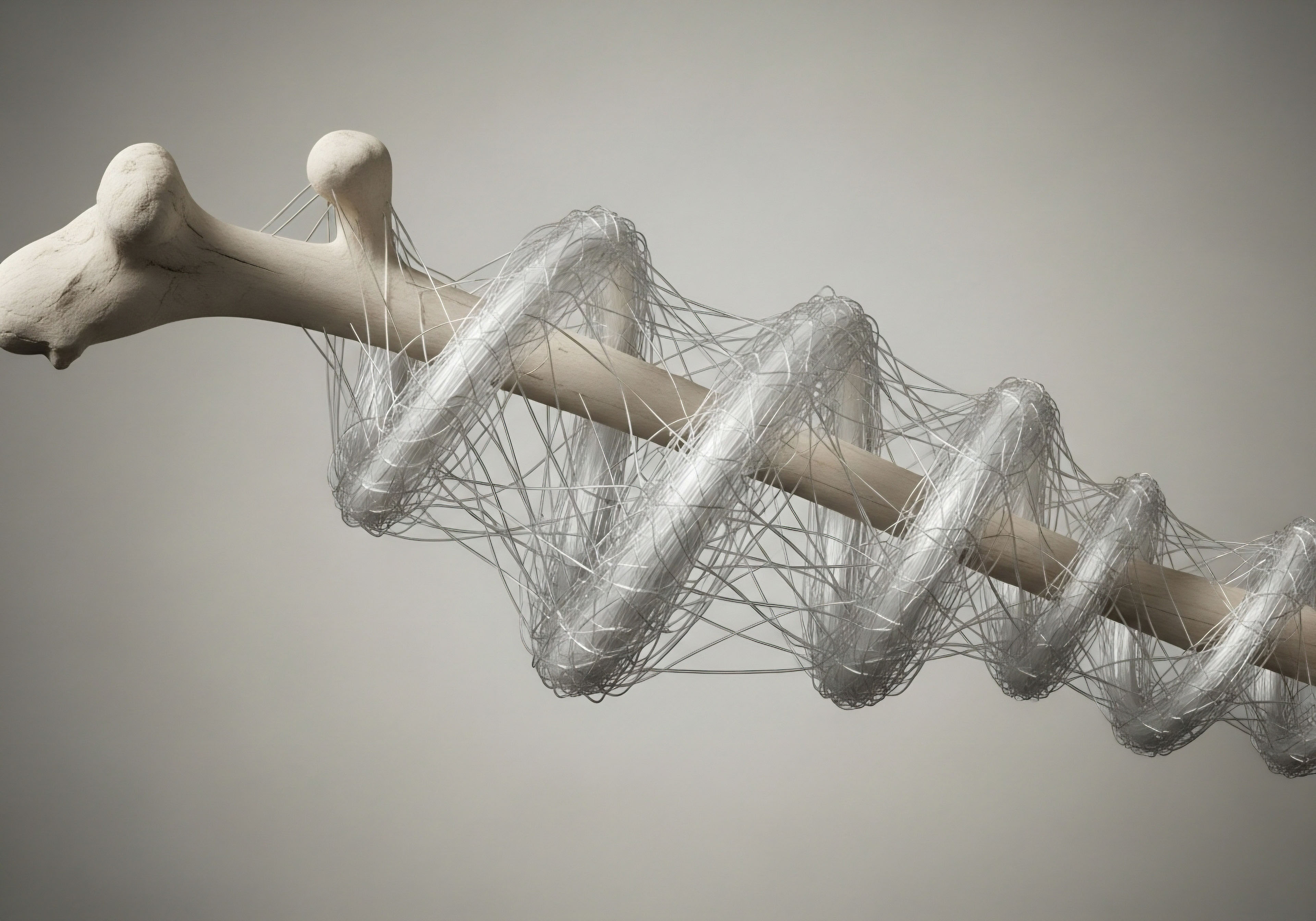

Fundamentals
You may have noticed a subtle shift in your mental clarity, a fog that descends when you need to be sharpest. This experience, a change in your ability to recall information or organize your thoughts, is a deeply personal and often frustrating reality.
Your cognitive function is intrinsically linked to the complex and elegant communication network within your body, the endocrine system. Hormones are the primary messengers in this system, chemical signals that travel through your bloodstream to instruct cells and organs on their function. This includes the most complex organ of all, the brain.
The brain is densely populated with receptors for these hormonal messengers, meaning its performance is directly influenced by your endocrine health. When hormonal balance is optimal, cognitive processes can operate with efficiency. When these levels shift, as they naturally do with age or due to other health factors, the brain’s ability to process, store, and retrieve information can be affected.
Two of the most influential hormones in this context are testosterone and estrogen. While often categorized by sex, both are vital for male and female physiology, particularly for brain health. Testosterone, for instance, has a direct influence on brain regions like the hippocampus and prefrontal cortex.
The hippocampus is a key area for memory formation, while the prefrontal cortex governs executive functions such as planning, decision-making, and moderating social behavior. Optimal testosterone levels support the structural integrity and function of these areas. In both men and women, a decline in this hormone can correspond with symptoms of cognitive fatigue and a perceived decrease in mental acuity.
This is a biological reality, a reflection of the brain’s dependence on these specific chemical signals to maintain its intricate operations.
The brain’s performance is directly tied to the health of the endocrine system, with hormones acting as essential regulators of cognitive processes.

The Architecture of Cognition
Understanding how hormones affect memory requires looking at the brain’s cellular level. Hormones support neuroplasticity, the brain’s remarkable ability to reorganize itself by forming new neural connections. Estrogen, for example, has been shown to promote the growth of dendritic spines, which are tiny protrusions on neurons that receive information from other cells.
A higher density of these spines is associated with enhanced learning and memory capacity. As estrogen levels fluctuate, particularly during perimenopause and menopause, women may experience noticeable changes in verbal memory and processing speed. This is a direct consequence of the shifting biochemical environment in which the brain operates.
The feeling of “brain fog” is a subjective experience of a real physiological event. Hormonal protocols are designed to restore this biochemical environment, providing the brain with the resources it needs to maintain its plastic and adaptive capabilities.

Executive Function and Hormonal Influence
Executive function is a suite of high-level cognitive skills that you use every day to manage your life. These skills include working memory, cognitive flexibility, and inhibitory control. Working memory allows you to hold and manipulate information over short periods, such as when solving a problem.
Cognitive flexibility is your ability to switch between different tasks or ways of thinking. Inhibitory control helps you resist distractions and regulate your impulses. All of these functions are heavily reliant on the prefrontal cortex, a brain region that is highly sensitive to hormonal signals.
Research indicates that testosterone plays a role in modulating the activity of this region. When levels are balanced, it can support focus and decisiveness. When they are low, individuals may report difficulty with concentration, organization, and emotional regulation. These are not character failings; they are physiological symptoms that reflect the intricate connection between your endocrine system and your cognitive command center.


Intermediate
Moving beyond foundational concepts, we can examine the specific mechanisms through which hormonal optimization protocols directly affect cognitive performance. These interventions are designed to recalibrate the body’s internal messaging system, addressing deficiencies or imbalances that manifest as cognitive symptoms. The goal is to restore the biochemical environment that supports neuronal health and efficient neurotransmission.
This process involves a targeted approach based on an individual’s specific physiology, laboratory diagnostics, and reported symptoms. The protocols are a form of systemic support, acknowledging that cognitive vitality is inseparable from overall metabolic and endocrine health.

Male Hormonal Protocols and Cognitive Recalibration
For men experiencing symptoms of andropause, a standard therapeutic approach involves Testosterone Replacement Therapy (TRT). The objective is to restore circulating testosterone to a healthy physiological range. This has direct implications for the brain. Testosterone can cross the blood-brain barrier, where it interacts with androgen receptors located in key cognitive centers.
Its presence can enhance the production of certain neurotransmitters and support the survival and growth of neurons. The protocol often involves more than just testosterone to ensure systemic balance and mitigate potential side effects.
A typical TRT protocol is multifaceted, designed to support the entire Hypothalamic-Pituitary-Gonadal (HPG) axis. Here is a breakdown of common components:
| Component | Mechanism of Action | Cognitive Rationale |
|---|---|---|
| Testosterone Cypionate | A long-acting ester of testosterone, it provides a stable elevation of serum testosterone levels. | Directly addresses low testosterone, which is linked to cognitive fatigue, poor concentration, and reduced spatial memory. |
| Gonadorelin | A GnRH analogue, it stimulates the pituitary gland to produce Luteinizing Hormone (LH), which in turn signals the testes to produce their own testosterone. | Maintains the natural function of the HPG axis, preventing testicular atrophy and supporting a more balanced endocrine environment. |
| Anastrozole | An aromatase inhibitor, it blocks the conversion of testosterone into estrogen. | Manages estrogen levels to prevent side effects like water retention and gynecomastia, which can indirectly affect well-being and cognitive state. |
| Enclomiphene | A selective estrogen receptor modulator (SERM), it can be used to stimulate the pituitary to release LH and FSH, boosting endogenous testosterone production. | Offers another pathway to support the body’s own hormone production, contributing to overall systemic balance. |
By addressing hormonal balance in this comprehensive way, the protocol aims to alleviate the central nervous system symptoms associated with low testosterone, such as brain fog and diminished executive function.
Targeted hormonal protocols for men are designed to support the entire HPG axis, providing a stable biochemical foundation for improved mental clarity.

Female Hormonal Health and Cognitive Support
For women, particularly during the perimenopausal and postmenopausal transitions, cognitive complaints are common. These are often linked to the fluctuating and declining levels of estrogen and progesterone, as well as a subtle decline in testosterone. Hormonal protocols for women are carefully tailored to address these specific changes.
- Testosterone Therapy for Women ∞ Women produce and require testosterone for energy, mood, libido, and cognitive function. Low-dose Testosterone Cypionate is often prescribed to restore levels to a healthy female range. This can have a significant impact on mental energy and focus, helping to cut through the fog that many women report during this life stage.
- Progesterone’s Role ∞ Progesterone has a calming effect on the brain. It interacts with GABA receptors, which are the primary inhibitory neurotransmitter system. Supplementing with bio-identical progesterone can improve sleep quality and reduce anxiety, both of which are foundational for optimal cognitive performance during the day. Improved sleep alone can lead to substantial enhancements in memory consolidation and executive function.
- Estrogen and Neurotransmission ∞ While not always part of a “TRT” protocol per se, estrogen replacement is a key consideration for cognitive health in menopausal women. Estrogen supports healthy levels of neurotransmitters like serotonin and acetylcholine, which are critical for mood and memory.

What Is the Role of Peptide Therapy in Cognitive Enhancement?
Peptide therapies represent another frontier in wellness protocols that can indirectly but powerfully affect cognitive function. These are short chains of amino acids that act as signaling molecules in the body. Growth hormone secretagogues, such as a combination of Ipamorelin and CJC-1295, are particularly relevant.
These peptides stimulate the pituitary gland to release growth hormone in a natural, pulsatile manner. The primary cognitive benefit comes from the profound improvement in sleep quality, specifically deep-wave sleep. It is during this sleep stage that the brain performs critical maintenance, including clearing out metabolic waste and consolidating memories. By enhancing sleep architecture, these peptides provide the brain with the restorative conditions it needs to function optimally.


Academic
A sophisticated analysis of how hormonal protocols affect cognition requires a departure from simple cause-and-effect models. The true clinical picture involves a complex interplay of steroid hormone metabolism, genetic predispositions, and sex-specific physiological responses.
The brain’s sensitivity to hormones is not uniform; it is modulated by a person’s unique genetic makeup and the local biochemical environment within specific neural circuits. Understanding this requires a systems-biology perspective, where the cognitive outcome of a hormonal intervention is viewed as an emergent property of a dynamic, interconnected network.

The Modulatory Role of Genetics in Hormonal Efficacy
Recent research has highlighted the significant role of the Apolipoprotein E (APOE) gene in mediating the cognitive effects of sex hormones. The APOE-ε4 allele is a well-established genetic risk factor for developing Alzheimer’s disease.
A 2024 study published in Frontiers in Aging Neuroscience provided compelling evidence that the relationship between testosterone levels and cognitive function is dependent on APOE-ε4 status, particularly in women. The study found that in female APOE-ε4 carriers, lower plasma testosterone levels were significantly correlated with worse performance in global cognition, processing speed, and verbal memory.
This relationship was absent in women who did not carry the ε4 allele, and it was not observed in men regardless of their APOE status.
This finding is of profound clinical importance. It suggests that for a specific subset of the female population, maintaining optimal testosterone levels may be a critical neuroprotective strategy. The mechanism is likely multifactorial, possibly involving testosterone’s role in promoting neuronal resilience, reducing neuroinflammation, or influencing amyloid-beta metabolism, processes that are particularly challenged in APOE-ε4 carriers.
This underscores the necessity of personalized medicine; a hormonal protocol should ideally be informed by an individual’s genetic background to predict its potential efficacy for cognitive support.
The cognitive impact of testosterone in women is significantly modulated by the APOE-ε4 genetic allele, highlighting a new dimension of personalized neuro-endocrinology.

Metabolic Conversion and Its Cognitive Consequences
Testosterone itself is just one actor in a larger play. Its biological effects are mediated not only by its direct action on androgen receptors but also through its conversion into other potent hormones. Two key enzymes are responsible for this conversion ∞ 5-alpha reductase, which converts testosterone to dihydrotestosterone (DHT), and aromatase, which converts testosterone to estradiol. Each of these metabolites has a unique profile of action within the brain.
| Hormone | Primary Conversion Pathway | Key Cognitive and Neurological Effects |
|---|---|---|
| Testosterone | Acts directly on androgen receptors. | Supports spatial cognition, motivation, and has neuroprotective properties. Influences the prefrontal cortex and hippocampus. |
| Dihydrotestosterone (DHT) | Converted from testosterone via 5-alpha reductase. | A more potent androgen than testosterone. Binds with high affinity to androgen receptors. Its specific role in cognition is less clear but it is vital for organizational effects on the brain during development. |
| Estradiol | Converted from testosterone via aromatase. | Crucial for both male and female brain health. Supports synaptic plasticity, enhances memory formation, and has powerful antioxidant and anti-inflammatory effects in the brain. |
The “aromatization hypothesis” posits that many of testosterone’s beneficial effects on the male brain are actually mediated by its conversion to estradiol within the brain itself. This local production of estrogen is critical for neuronal health.
Therefore, a clinical protocol that excessively blocks aromatization (for example, with high doses of anastrozole) in an attempt to maximize testosterone could inadvertently deprive the brain of the neuroprotective benefits of estradiol. This highlights the delicate balance that must be achieved in hormonal optimization for cognitive health. The goal is not simply to raise one hormone but to foster a balanced and supportive biochemical milieu for the central nervous system.

How Does the HPA Axis Interact with Hormonal Protocols?
The Hypothalamic-Pituitary-Adrenal (HPA) axis, the body’s central stress response system, is deeply intertwined with the Hypothalamic-Pituitary-Gonadal (HPG) axis. Chronic stress leads to elevated cortisol levels, which can have a suppressive effect on the HPG axis, reducing testosterone production. High cortisol is also directly neurotoxic, particularly to the hippocampus, impairing memory formation.
When implementing a hormonal protocol, it is essential to consider the patient’s HPA axis status. A protocol may be less effective in the face of unmanaged chronic stress. Conversely, optimizing gonadal hormones can improve resilience to stress, creating a positive feedback loop.
For example, balanced testosterone can improve mood and reduce anxiety, which may help down-regulate a chronically activated HPA axis. This systemic view is essential for protocols aiming to improve cognitive function, as the brain is exquisitely sensitive to the combined signaling of both gonadal and adrenal hormones.

References
- Maki, P. M. & Henderson, V. W. (2016). Hormone therapy, dementia, and cognition ∞ the Women’s Health Initiative Memory Study. Climacteric, 19(3), 256 ∞ 261.
- Janse, R. J. et al. (2024). Low testosterone levels relate to poorer cognitive function in women in an APOE-ε4-dependant manner. Frontiers in Aging Neuroscience, 16, 1358325.
- Grigorova, M. et al. (2021). On the effects of testosterone on brain behavioral functions. Frontiers in Neuroscience, 15, 762632.
- Hogervorst, E. et al. (2004). Serum total and free testosterone and verbal memory in older men and women. Journal of Clinical Endocrinology and Metabolism, 89(11), 5515-5520.
- Cherrier, M. M. et al. (2005). Testosterone supplementation improves spatial and verbal memory in healthy older men. Neurology, 64(8), 1339-1347.
- Beauchet, O. (2006). Testosterone and cognitive function ∞ current clinical evidence of a relationship. European Journal of Endocrinology, 155(6), 773-781.
- Holland, J. et al. (2011). Testosterone and cognition in aging men ∞ a review. Current Opinion in Endocrinology, Diabetes and Obesity, 18(3), 197-202.

Reflection

Translating Knowledge into Personal Insight
The information presented here offers a map of the intricate biological landscape that connects your hormonal health to your cognitive world. You have seen how these powerful chemical messengers sculpt your brain’s architecture and regulate its function. This understanding is a powerful tool.
It reframes the experience of cognitive change, moving it from a place of uncertainty to a field of physiological inquiry. The subtle lapses in memory or the frustrating presence of mental fog are not just feelings; they are data points. They are signals from your body’s complex internal system.
Consider your own experiences in the context of this biological framework. How do the rhythms of your energy and mental clarity align with what you now understand about your endocrine system? This knowledge is the first step in a proactive partnership with your own body.
It prepares you to ask more precise questions and to seek solutions that are as unique as your own physiology. Your personal health story is the most important text in this entire process, and you are its primary author. The path forward involves listening to that story with a new level of scientific understanding, empowering you to make informed decisions for your long-term vitality.

Glossary

cognitive function

endocrine system

prefrontal cortex

testosterone levels

verbal memory

hormonal protocols

executive function

hormonal optimization

testosterone replacement therapy

androgen receptors

cognitive health

apoe-ε4 allele

anastrozole

hpg axis




